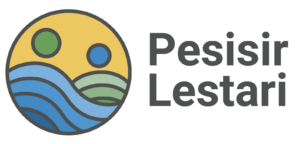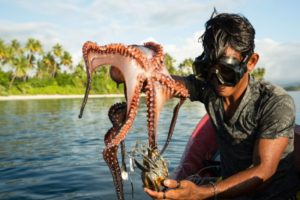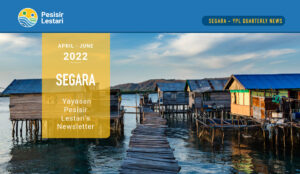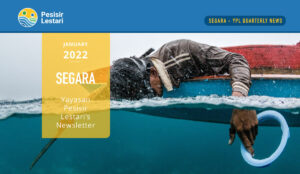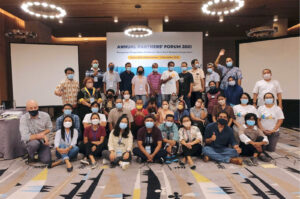In Indonesia, World Fisheries Day was celebrated as a moment to recognise the importance of sustainable fisheries for the future of fishers, coastal communities, and the nation.
Indonesia is among the top 10 global octopus exporters, with an export volume of around 19,000 tons/year and average value of $90 million USD/year. The increasing demand for octopus – especially Octopus cyanea – for export to Italy, the United States and China, has made octopus a high value product. This demand is putting extreme pressure on the species and their survival.
To celebrate World Fisheries Day, Blue Ventures’ partner Yapeka collaborated with the Ministry of Marine and Fisheries Affair (MMAF) to host a webinar, ‘The Portrait of Octopus Fisheries in Indonesia’ on 19th November 2020.
The webinar brought together government officials from MMAF, marine conservation organisations, and octopus fishers, giving a glimpse into what octopus fisheries in Indonesia look like – the locally led initiatives and the global fisheries trend.
“We have 7.9 million coastal communities dependent on the coral reefs sustainability. The hope is that conservation can give not only ecological impact but also economic impact to the communities,” Hendra Yusran Siry (Secretary of the Directorate General of MMAF), opened the webinar, reminding us what President Jokowi said, that “the nation’s future is at the sea”. And that will only be achieved through multi-stakeholder collaboration and synergy.
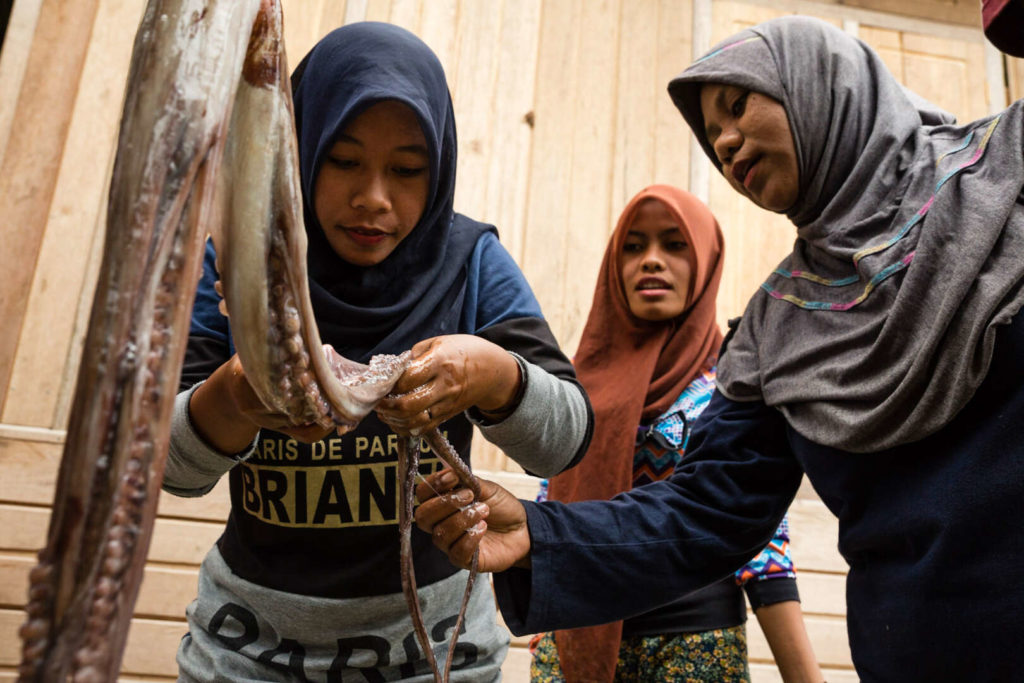
Discussing octopus fisheries trends
Dessy Anggraeni (Indonesia FIPs [fisheries implementation plan] Director, Sustainable Fisheries Partnership) explained the global octopus fishery trend.
“Indonesia should work with supply chains upstream and downstream to improve fisheries towards sustainability. Right now, unfortunately, octopus are still not a priority species for protection – we don’t have enough data of octopus production,” she said.
Almost all octopus production in the world comes from capture fisheries (i.e. when fish is captured from the sea, rather than farmed through aquaculture). According to FAO data, global octopus production is around 420 thousand tons/year, mostly from small-scale fisheries. According to statistical data on capture fisheries from Indonesia’s Central Bureau on Statistics, Indonesian octopus production fluctuates at around 11 thousand tons per year. “We need more accurate data that reflects the octopus fishery,” she emphasised.
According to the Seafood Watch List, Indonesia’s octopus products are under the ‘to avoid’ or ‘red’ categories. This means that the octopus product is not yet considered sustainable. This is one of the guidelines used by consumers, especially in the United States, that contributes to a consumer’s purchase decision making.
“This doesn’t mean that Indonesia’s octopus products can’t be consumed, but there’s room for octopus fisheries sustainability improvement in the future,” added Dessy.
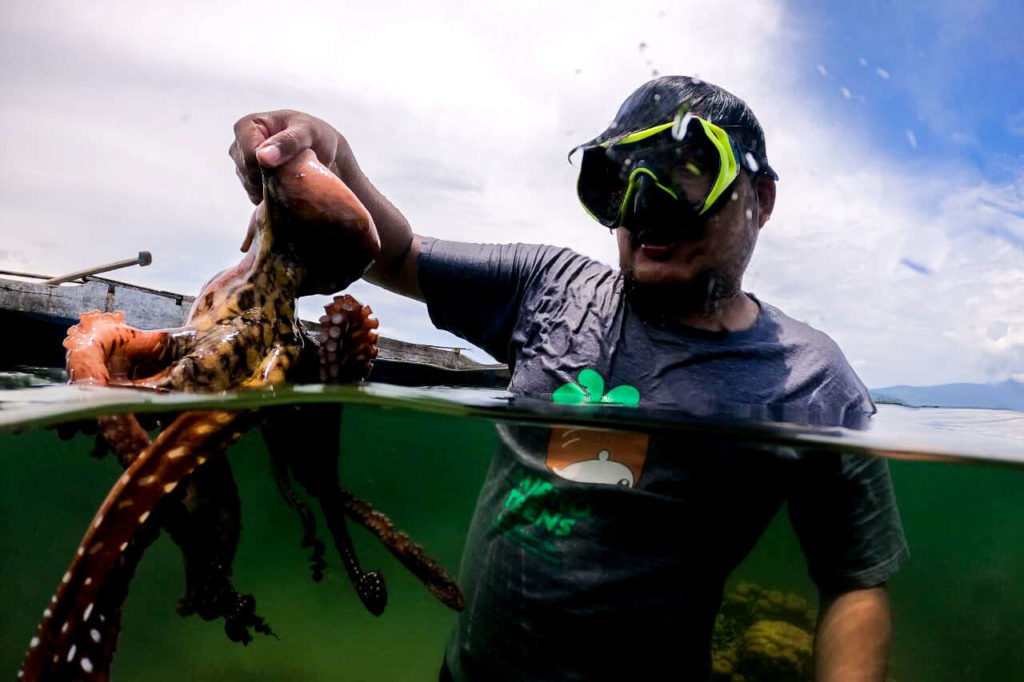
Locally led octopus fisheries management initiatives
“During this pandemic, octopus prices dropped significantly, even until now,” said Aswadi Sahari, an octopus collector from Bulutui Village, North Minahasa, North Sulawesi. Aswadi shared how octopus prices dropped since companies stopped exporting octopus to their destination country because of restrictions on global trade due to COVID-19.
Aswadi was one of the speakers on the panel session with Gayatri Reksodihardjo-Lilley (Director, LINI Foundation), La Beloro (Director, Forkani), Akbar Ario Digdo (CEO, Yapeka), and Pingkan Katharina Roeroe (Coordinator of Fish Species Protection and Conservation, MMAF).
The panel sessions gave the organisations the opportunity to share more about how the communities they support in Banggai, Central Sulawesi; Wakatobi, Southeast Sulawesi; and Minahasa Utara, North Sulawesi respectively, have started to engage in locally led management of their octopus fisheries.
Gayatri shared a story from communities in North Banggai subdistrict, where traditional Bajo fishers have started monitoring their octopus catch. This data has become an empowering tool for the community, enabling them to make more informed decisions about how to manage their octopus fishery through periodic fishery closures – periods of time when certain fishing locations are closed to fishers, agreed by the community.
Reef octopus have a short life cycle (around 15-18 months) but a rapid growth rate, and are able to almost double in weight every month for the first six months of their life. This is why periodic fishery closures are so effective; the reduced fishing pressure, even just for a short period, means that the octopus are able to dramatically increase in size.
La Beloro emphasised the importance of collaboration between traditional community institutions, national park officials and the government in octopus fisheries management amongst the Darawa community who live within Wakatobi National Park – where they also have locally led octopus fisheries management in place through temporary closures.
Akbar talked about Rumah Boboca (“the home of octopus”), where Yapeka have helped the communities in Bulutui and Gangga Satu, West Likupang subdistrict, to establish a catch monitoring system and have trained octopus buyers in the village as data collectors – and later established temporary octopus fisheries closure.
“Although octopus is not included in the endangered list, sustainability needs to be managed, because its habitat is on coral reefs. For example, the management of fishing methods that do not damage the coral reef,” said Pingkan K. Roeroe. “The community and government need to work together, each has their own roles. The participation of the community is the key for success in conservation,” she added.
Photo: Garth Cripps
